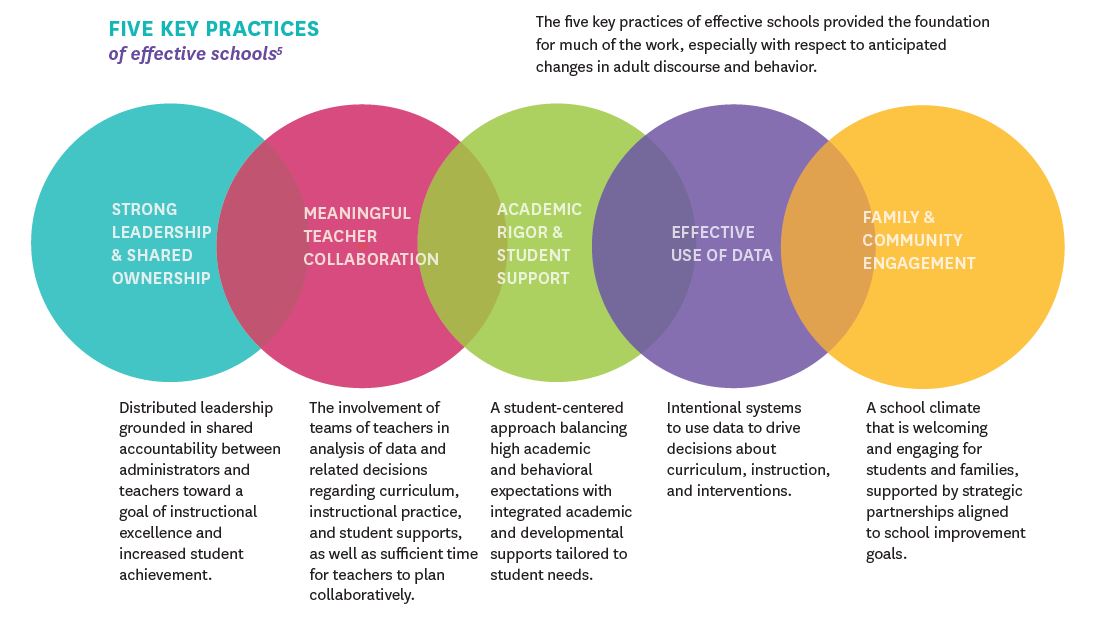Research & Insights / What it Takes for Schools to Improve: Lessons Learned from the Improving Schools Initiative
What it Takes for Schools to Improve: Lessons Learned from the Improving Schools Initiative

In 2012, EdVestors launched the Improving Schools Initiative to see if and how practices from higher-performing schools could be utilized in a cohort of lower-performing schools to improve academic outcomes for students. A study of the best practices in our School on the Move prize-winning schools (schools recognized for rapid improvement over a five-year period), coupled with national research, resulted in a framework that outlines five key practices of effective schools. This framework guided the Improving Schools Initiative.
With this knowledge we crafted a theory of action for the Initiative: If schools: (a) are given the opportunity to develop a data-driven and focused improvement plan that includes input from the entire staff and (b) receive targeted and intensive support towards implementing that plan with depth and fidelity aimed at supporting and changing adult practices (as reflected in the five key practices of effective schools), then the school will build the capacity to significantly improve student achievement.
The leaders and teachers of three elementary schools in Boston, the Condon, Mendell, and Russell, welcomed EdVestors to work with them on a joint effort to improve and increase achievement for all students. Over the subsequent four years, we engaged in deep partnerships at each school to refine and demonstrate a systems-based approach to school improvement. Lessons learned from this effort provide a nuanced set of insights for schools, districts, and whole school improvement partners, particularly in the areas of Academic Rigor & Student Support and Strong Leadership & Shared Ownership.
Academic Rigor & Student Support
During the course of the Initiative, the singular importance of instruction and efforts to improve both school-level and classroom instruction became evident. While references to instruction are woven throughout the key practices, we learned that it is vital to be explicit. A focus on, and shared understanding of, rigorous and high-quality instruction, coupled with shared ownership among all teachers for students’ learning, is crucial to success. It is equally important that the principal be able to mobilize efforts around dramatically improving instruction through messaging, creating a climate of feedback and support, appropriately targeting resources, using data to focus on tiered instruction to students, and managing staff and schedules so that instructional improvements can take hold.
Strong Leadership & Shared Ownership
Leadership capacity is often cited as the foundation of a collective school improvement effort, and that was certainly the case here. In the three schools, principal leadership influenced nearly all aspects of each school’s improvement. More precisely, each principal’s disposition—the ways they were inclined to interact with and support the school community—influenced their ability to successfully balance efforts to improve instruction while cultivating and maintaining the relational trust that is necessary for the school, as an organization, to drive improvement efforts forward. As a school partner, we learned that building a trusting and supportive relationship with each school leader was foundational to our collective effort.
Leadership also needs to extend beyond the principal for improvement to take hold and be sustainable. Shared organizational leadership, including teachers and other key staff, provides the catalyst for the collective and collaborative ownership of improvement throughout the school community. A hard to measure but often-cited characteristic of effective schools is the adults’ collective responsibility for all students and a ubiquitous belief, amongst teachers, that they can directly impact their students’ achievement no matter the circumstances. This is evident when each teacher believes that they can individually, collectively, and as a school make a significant impact on the achievement of all their students. Both principal and organizational leadership are crucial to successful school improvement efforts as they develop the organizational capacity needed to make progress and withstand internal and external changes. We learned that this aspect of school improvement, an intentional focus on mindset and collective ownership, cannot be overlooked and needs to be incorporated into any improvement plan.

Reflections
As we reflect on this work, we are reminded that school improvement is very complex, requiring commitment and focused attention sustained over a period of time. There are no quick fixes or silver bullets. As an EdVestors demonstration project, the lessons learned from the Improving Schools Initiative guide EdVestors’ work in ongoing ways, including in the design and implementation of our newest effort to improve student learning outcomes, the Zeroing in on Math Initiative. If you are interested in learning more about this work, please be in touch. Sharing insights on how schools make progress, as well as what impedes improvement, is the only way we collectively will increase achievement and close gaps for our learners with the greatest needs.




